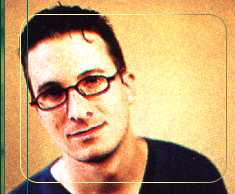(another version of the story appeared in “ The Star” in 1998)

Darren Aronofsky
“Pi” is not your average, run of the mill film, and the story of its director, Darren Aronofsky is also atypical. In our phone interview, the 29-year-old came off as intense, hip and extremely knowledgeable about both high brow and trash culture.
When he was a child, Aronofsky’s parents often took him to Broadway shows, and these formative experiences gave him a great appreciation for spectacle.
He didn’t become seriously interested in film until he attended Harvard. He roomed with an aspiring animator, and seeing his roommate’s assignments made Aronofsky reconsider his future.
“I was a social theory major, but I decided it would be much more exciting to make films then to continue writing papers that were only good for burning,” he said.
After winning a highly esteemed award for the Dramatic Competition at the 1998 Sundance Film Festival Aronofsky became the toast of the town. Even the normally mainstream “Entertainment Weekly” named him as one the 25 most creative people in film in its summer, 1998 double issue. However, the future wasn’t always so promising for him, and he has previously seen his share of hard times.
Shortly after high school, he went on a kibbutz or a spiritual pilgrimage to Israel, but he became frustrated with his menial plastic factory job. He had a breakdown and ran off for several days.
Then he encountered a group of Hasidic Jews. He told me, “When I was with them, I saw things that you’d call miracles.” They shared some of their secrets without hem, but they failed in their efforts to recruit him to the group.
When he came back to America, he was surprised to find that many of his old acquaintances were deeply involved in the stock market. These experiences with the two highly disparate groups (in their own way they were both trying to find order in chaos) helped inspire “Pi.”
He added, “There have always been people looking for God–witness the success of books like ‘The Celestine Prophecy,’ so I decided to make a film about a search for God. After all, not everyone wants to see Ben Affleck making out with Liv Tyler. He was obviously referring to the then recent hit “Armageddon.”
The Brooklyn native set out to make a truly daring piece of “speculative fiction” (the phrase was first coined by Harlan Ellison) that would explore the connection between mythology and technology, with a mere $600, 000 budget.
To make the film, the enterprising director borrowed $100 from many of his friends and relatives. In return, he promised to pay them back $150 if the film made money, and they would at least get screen credits if the film lost money. The film took him considerable time to make and his parents were pressuring him to get a “real job.”
Finally, all of Aronofsky’s hard work paid off. “Pi” was a sensation at Sundance, and it was purchased by Artisan Entertainment for a million dollars. The film went into general release and had a successful run at the Pipers Alley Theater in Chicago. It made back the initial investment and then some. It also acquired nearly universal acclaim in film critic circles, (I gave the film 3 ½ stars out of 4, and I put it on my top 10 films of 1998 list.)
When he spoke about his influences, Aronofsky showed he had was extremely knowledgeable about television, and classic films as well as new cinematic trends, “Rod Serling was one of my great patron saints of film.” He said that “Eye of the Beholder (1960)” was one of his favorite episodes. He also loved the episode, “Back There (1961), in which someone went back in time to prevent John Wilkes Booth from killing Lincoln.
In addition, Aronofsky is an admirer of new Japanese cinema. He told me “Pi” was an attempt to do a film like “Tetsuo: The Iron Man,” but with more of an actual plot. He is also a fan of Japanese anime films such as “Akira.” (see my article on the best comic book films.) Many of these influences are evident in “Pi’s” more surreal sequences.
Aronofsky is also a huge comic and graphic novel fan. Dark Horse Comics released his adaptation of “Pi”. According to “Entertainment Weekly,’ he also hopes to someday work with Alan Moore the British comic writer. Moore is considered a genius in comics circles and he wrote “The Watchmen, ” “From Hell,” “Swamp Thing,” “The Killing Joke,” and “ The League of Extraordinary Gentleman.”
It’s apparent that Aronofsky is going places. After all of his hard work and determination, it’s only fair that he’s getting his fair share of the pi.
After our interview, Aronofsky’s solidified his reputation as a maverick young filmmaker. He directed a film adaptation of “Requiem for a Dream,” a novel by Hubert Selby Jr. It received near universal acclaim, and Ellen Burstyn’s riveting performance in the film received an Oscar nomination for best actress in a supporting role (it also earned an Independent Spirit nomination for best female lead.).
Aronofsky also wrote the script for the World War II horror film. “Below” which features both Nazis and monsters. His next project will be “The Fountain” which also features Burstyn. In the future, he is also planning to do eventually make “Batman: Year One,” based on Frank Miller’s groundbreaking comic series.